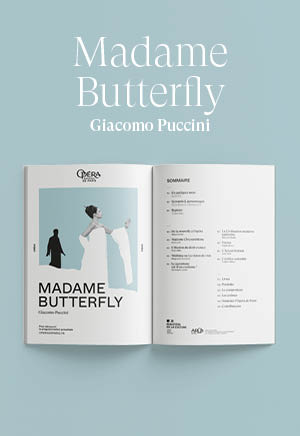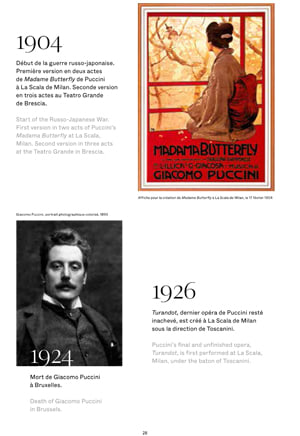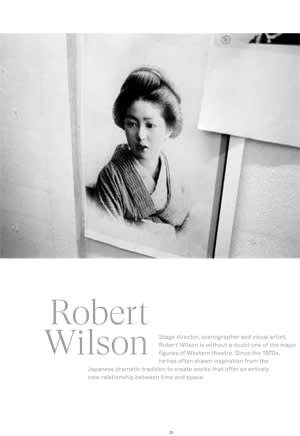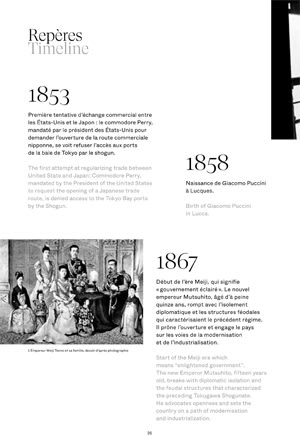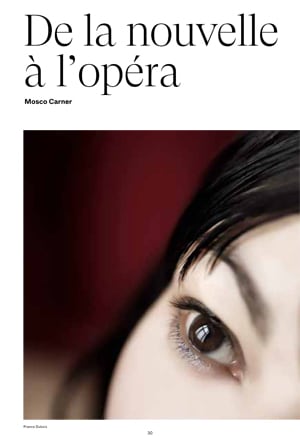«
Dear
Madam Butterfly,
I have taken the liberty of writing to you even though we do not know each other – or rather, even though you do not know me, for who in the wide world has not at least heard your name? Having seen you reappear very recently, I wished to express in a letter – that most intimate form of communication- my sentiments concerning what you have experienced.
Yours is a story, above all, not so much about conversion as about belief. You have embodied the entire range of meanings of the verb “believe”, with all its densest and richest subtleties. This verb accompanies you everywhere – it even precedes you. Before you first appear on stage, the Consul, Sharpless, warns Pinkerton: “Beware, she believes in it.” From the outset you are enshrouded in this attribute.
Why did you convert to Christianity? I think I can understand it. You were born in Nagasaki, where, in the 16th Century, Christianity first entered Japan. This faith was more familiar to you than to the rest of the country. When it was forbidden in the 17th Century, Christians were forced into hiding. Conflicts with traditional religious confessions became increasingly acrimonious, as your uncle Bonze’s anger shows.
You must have known that Christianity is the religion of love. Strange as it may seem to foreigners, there is no word for “love” in Japanese. In those days, there were only the words iro: “sensuality” or “carnal desire”; jô: “attachment” or “affection”; and finally ai which now extends to the western conception of love but which once expressed only the nuance “cherish”. One could not fall in love in Japanese. Indeed, you are not the only one to have noticed. It was at this period that, with the translation of the word “love”, the Japanese discovered the sentiment that it denoted.
Through this religion you hoped to gain strength and independence. Thanks to your faith, everything would become possible. In fact, many doors remained closed to you, but it seemed to you that you had at last gained access to another world, to the modern age; to the West and the promise of a better life.
You said: “With my new life, I adopt a new religion”. You did not say which one. Perhaps for you it was not so much a belief in Christ the Redeemer as in simply a “new religion”.
Your life is not the banal story of submission and fidelity that one so often associates with Japanese women. As a Geisha, you must have known other men, even if your youth and respectable background preserved you from the cruel destiny that the world usually reserved for women. It may even be that your fidelity to Pinkerton was less a reflection of the qualities you appreciated in him than in the immense faith you placed in your new life. He appeared to you as representing the complete opposite of your straitjacketed existence and the pettiness of provincial morality. In a relationship where words seem to have little weight, it was with your body that you perceived all those tiny delicate subtleties. You soaked up every nuance of the word “love” and you believed in it, heart and soul.
In short, however cruel he was towards you, it is not Pinkerton’s betrayal that is the real cause of the tragedy. The true catastrophe, like an inescapable abyss, is that he was incapable of believing that anyone could die for love. On your wedding night, he said to you: “Love does not kill, it gives life” What went through your mind at that moment? That your love did not exclude death? There is nothing sad about this. With a Romeo at your side, you could have been a Juliet; that would have been a consummate love.
For the Japanese of the Edo period, death was the consummation of extreme passion. Young lovers whose union was forbidden or whose parents refused their marriage, often chose to die together.
Unlike those young couples, who plunged together into the abyss, you died alone. You chose an “honourable death” and to silence your other desires. You never intimated your intentions to him. But you knew that it is only after death that a being becomes unforgettable for those that knew him. You ended your days in such a way that Pinkerton could never have done with you. Perhaps you did not hear his remorse when he declares, “This torment will never end”.
My dear Butterfly, the reality staged by Robert Wilson is not other people’s reality: it is your reality, that of the world you built for yourself. I know some people persist in reading your story “in context”, as if you had no choice but to remain faithful to Pinkerton because your material survival depended on it; as if he treated your relationship lightly because you were only a Geisha, at a period when Japanese courtesans specialised in Western lovers.
Your past is not important. What counts is that you tried to make your love the centre of the universe – your universe. What others might well call the illusion of love was not an illusion for you.
In the setting Robert Wilson created for you, no noise from outside, no rumour of spiteful tongues comes to disturb you. Your every gesture bathed in light, your solitude simply renders you more sublime.
Indeed, I wonder if the visions embodied on the stage are not those which will pursue Pinkerton, haunted by you and by your story, for the rest of his life. The stylised gestures, which emerge in a purity that owes nothing to realism, might well represent the images struggling within his mind. And there you are, transformed in his eyes into a heroine of Greek tragedy.
Dear friend, I will not remind you of Cio-Cio-San, unlike those of the Japanese entourage that you wished to detach yourself from. Neither will I call you Mrs Pinkerton as you wished to be known because you are something other than the wife of that man. I shall call you Madam Butterfly, as people do throughout the world, out of deference and admiration.
In any case, who knows? Perhaps it was less love than wonder that so marked you, wonder at a new world you didn’t know existed. The great men of your time, Sôseki Natsume and Ôgai Mori for example, were also shocked by the confrontation between east and west: a vertiginous experience, demanding profound self-transformation and which continued to provoke considerable debate amongst writers of the next generation, men and women alike.
It is also for that reason that, for the Japanese, your story is so exceptional. By revealing the cruelty of the meeting of east and west, you are the only Japanese woman to have earned the status of heroine in that most European of art forms, opera. One must add that, for a long time, Butterfly was the only role allowed to Japanese singers on European stages. Several figures owe their celebrity to their performance of your role: Tamaki Muira, the first Japanese singer ever to be engaged by the Metropolitan Opera and who performed more than 2000 times during her twenty year stay in Europe in the twenties and thirties. Other Japanese singers even continued to honour your role on the great international stages during the two world wars. Thanks to you, those Japanese women were able to live the life that you had dreamed of and fulfilled themselves in the West as independent women.
However, your story always provokes ambivalent feelings for us. It touches us because it is also to some extent “our” story. There persists amongst the Japanese a certain bitterness that we were only admitted to the operatic repertoire in the guise of a “submissive” woman. In Europe, too many productions perpetuate the old Orientalist clichés and represent you as a poor, naïve geisha, which tends to irritate Japanese audiences. As well as passion in its purest form, your story embodies the incomprehension of the West and, alas, still resonates with us today.
The Japanese, for their part, have re-appropriated your story. In 1954, a Japanese-Italian production was filmed at the Cinecittà studios with the actresses of the Takarazuka theatre company, of whom Kaoru Yachigusa was the most gracious butterfly I have ever seen. The Japanese novelist, Masahiko Shimada, turned his attention to what happened to your son. He wrote the libretto for an opera in which your son, adopted by Pinkerton and his American wife, returns at last to his native land only to become a victim, in a terrible stroke of irony, of the destruction of Hiroshima and Nagasaki, your home town, at the hands of the Americans.
When we contemplate your story, we oscillate between passion and incomprehension. Like you, I am Japanese, I was born in Japan and I remember my first experience of the west – my arrival in France in the eighties. The west that I discovered seemed to open up a kaleidoscopic range of possibilities. After a good ten years or so in France, I lived in Rome where I discovered yet another Europe, as if I had only just arrived on the continent. Our encounters with the West shock and mark us forever. We try to get closer. For my part, I make myself write in both languages, Japanese and French, not so much to promote understanding, but to get the clearest possible sense of our differences and affinities. We Japanese are all a bit like Madam Butterfly, or we have been. We have all experienced the turmoil of emotions that the first encounter with the West always provokes. Except those, perhaps, who retreat into a narrow-minded nationalism in order to protect themselves from who knows what – perhaps from their own fear. The fear of being shaken up, changed by that otherness. But if that contact with others is not what we call life, or love, what is the point of living?
»
Ryoko Sekiguchi
Paris, 14th June 2015
































































